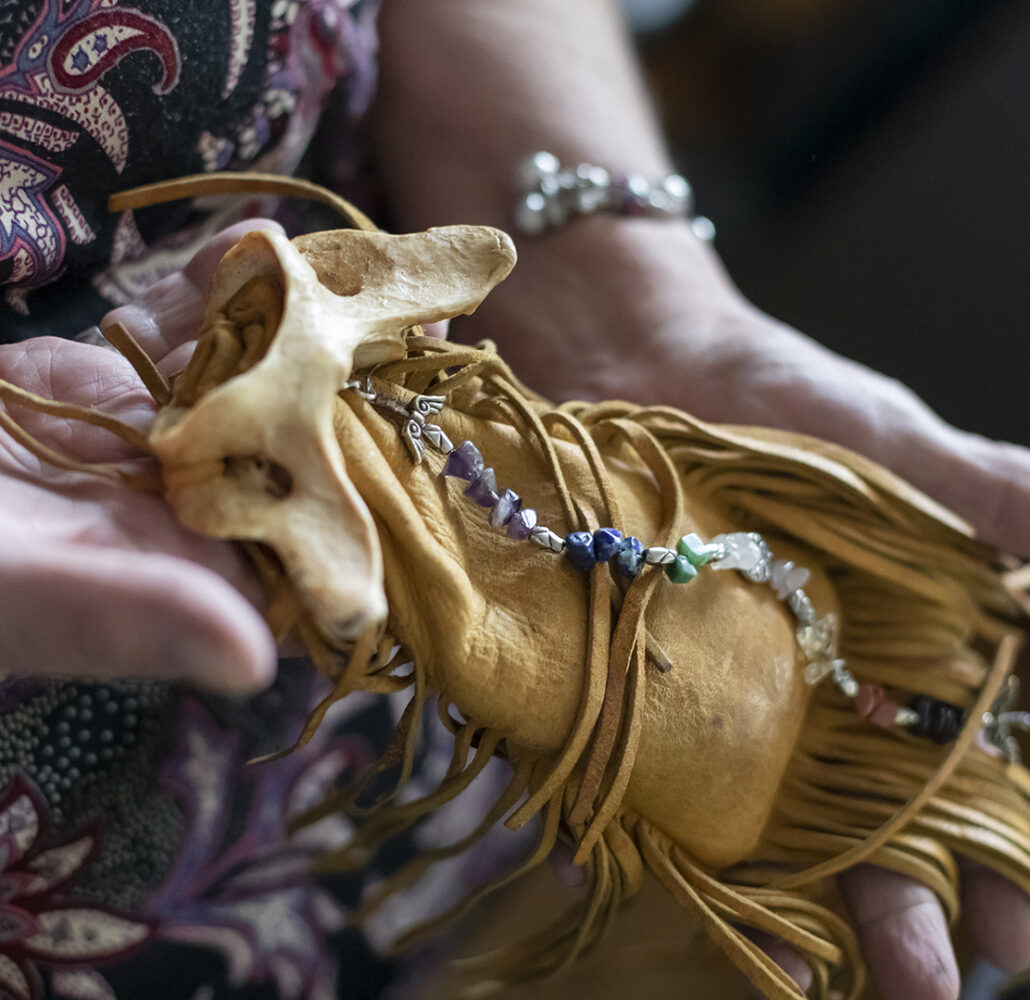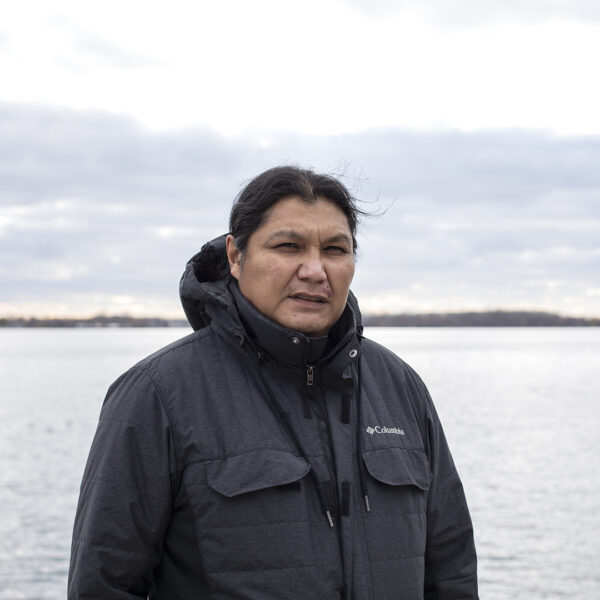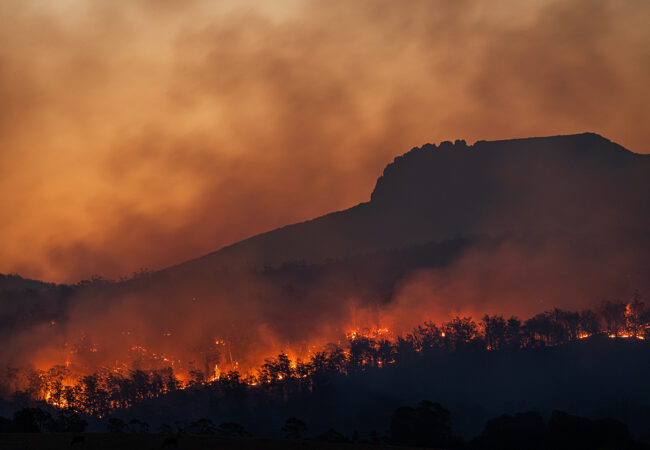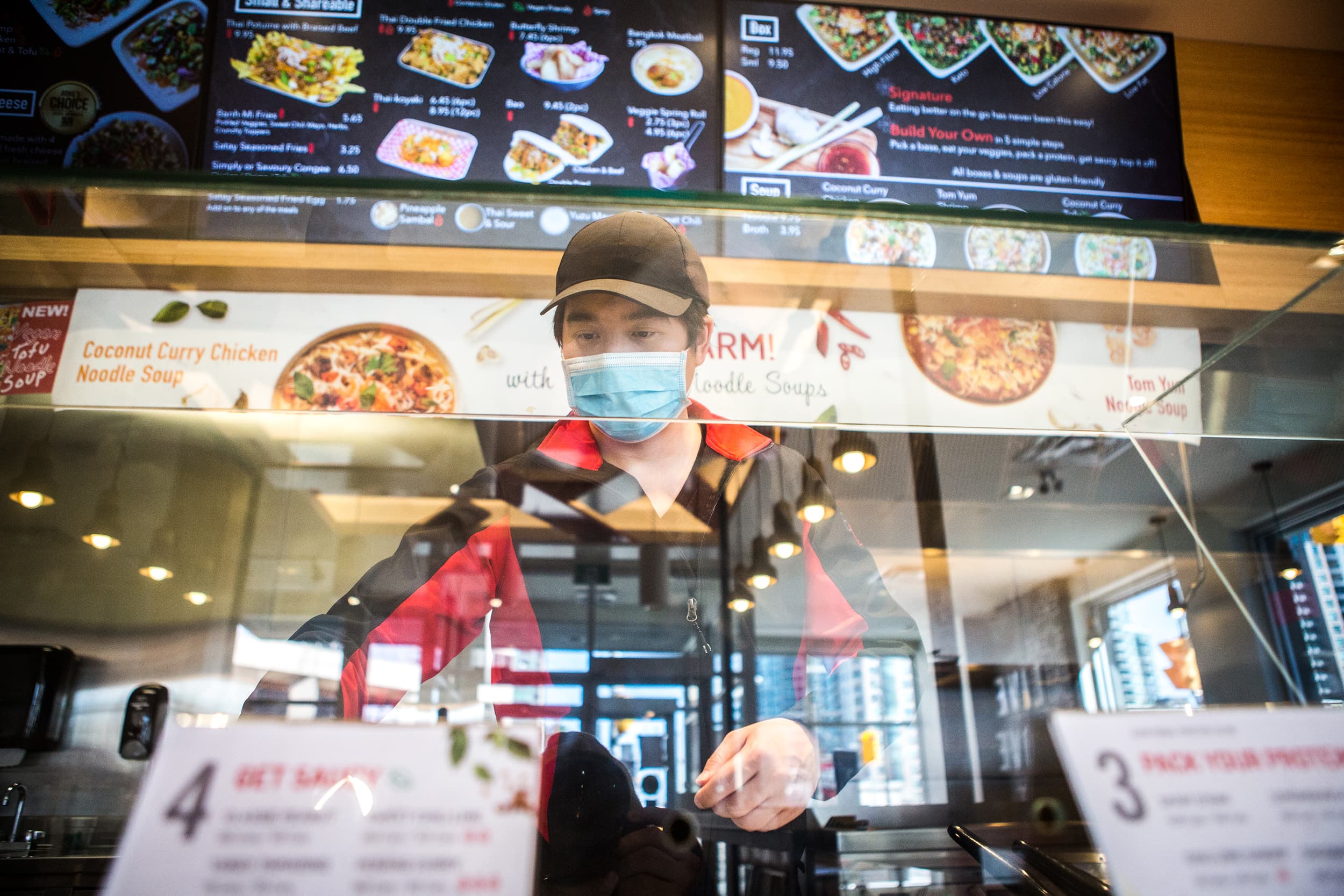In the wake of the May 27, 2021, confirmation of the remains of 215 children buried at a former B.C. residential school and the confirmations that followed, Amy Desjarlais (Waabishka Kakaki Zhaawshko Shkeezhgokwe) and her co-members of the Rebirthed Teachings (Kiwenitawi-kiwin Kiskino-hamatewina) Working Group wanted to take action.
Rebirthed Teachings is a group of Indigenous and non-Indigenous colleagues on campus who have come together to foster truth, understanding and respect between Indigenous and non-Indigenous peoples, as well as understanding about our shared history.
Desjarlais, who is Ojibway/Potowotomi from Wasauksing First Nation, anticipated that horrific stories about the residential school experience of Indigenous families would continue to come to light, making it imperative to look at our country’s violent past and walk a path of action together. To help, the group created a resource guide that shares educational materials and calls to action with the university community and beyond.
As a Knowledge Keeper and aunty, Desjarlais has been facilitating cultural workshops and drum circles for some time, but when the news broke about the children, she knew it was time settlers (non-Indigenous people) learned and challenged past misteachings too. “Right after the announcement in May, I was watching the communities’ reactions via social media. I know through the work that we’re doing with Rebirthed Teachings that participants have this response to the KAIROS Blanket Exercise like they need to do something,” says Desjarlais. The blanket exercise, developed by the Aboriginal Rights Coalition in partnership with Indigenous elders and teachers, is an interactive way of learning the history most Canadians haven’t been taught.
“With that in mind, as I saw peers and colleagues in the community offer different actions and responses, I reached out to Jeffrey McNeil-Seymour, professor in the School of Social Work, because he had suggested a couple of different actions and because he’s from the impacted community, Tk’emlúps te Secwépemc. I thought it was important to touch base with him, and make sure there was collaboration and that I was supporting his work.”
“The systems in Canada that ensure people know nothing about Indigenous Peoples are still in place. Dismantling that is really difficult, because it’s so thoroughly embedded.”
Together, McNeil-Seymour and Desjarlais, along with her collaborators within Rebirthed Teachings, came up with the list of educational and activist resources to share with the community. Along with links to past work of Rebirthed Teachings including an aftercare toolkit, the resource guide features educational materials from Yellowhead Institute, as well as other educational institutions, links to the Truth and Reconciliation Commission of Canada’s report, many documentaries and lectures to engage with and several calls to action.
“I recognize that for some people, they see these atrocities as history, and therefore disconnected from themselves and their lives,” says Rachel Barreca, university staff and settler member of the Rebirthed Teachings Working Group. “I’ve seen it said that ‘this happened hundreds of years ago, and you can’t blame me for that.’ But the colonial project is ongoing, and it continues to impact all of us in this country.”
Education is important for this reason, says Barreca, and because we have entered into treaties that must be honoured. “It’s important for us to educate ourselves as settlers about Indigenous Peoples’ histories, cultures and ways of knowing because we are guests on the lands of Indigenous Peoples of Turtle Island. And in many instances, we are people who are connected to the treaties that tell us how to take care of one another and the land.”
‘You can’t separate history from the current moment’
For Curtis Maloley, university staff and a settler member of the Rebirthed Teachings Working Group, the work has to move into a deeper space of knowing than just reading the 94 calls to action that came from the Truth and Reconciliation Commission’s report. “I know many folks that have looked at the calls to action but have never looked at the report. I think it’s crucial for us, if we want to try to understand the experiences of Indigenous Peoples in Canada, that we read the report to understand why the calls to action were necessary.”
For her master’s thesis, Desjarlais wrote Emptying the Cup: Healing Fragmented Identity, which explores an Anishinawbekwe perspective on historical trauma and culturally appropriate consultation; it was published by the Centre for World Indigenous Studies’ Fourth World Journal. “It included a guide for non-Indigenous folks to consult with Indigenous Peoples and to frame it as a relationship, and that’s where this work started.”
An approach to education and challenging misinformation we’ve been taught that starts with relationship building is essential to Desjarlais. “We approached the resource guide the same way that we did the KAIROS Blanket Exercise because, unlike the experience that Indigenous folks have had in learning western practices that was very traumatizing, it’s important for me as a leader to make things as gentle and kind as possible. And to make sure that people come to learning at their own pace, but give them some signposts and support on their path.”
“There’s no question about the impact of the residential school system on survivors,” says Maloley. “I think as Canadians we have a responsibility to try to understand the truth of history and why those impacts were so detrimental. You can’t separate history from the current moment, because the current moment is predicated on that history and we need to do our best to understand how the assumptions that led to the residential school system are still with us, and still have significant impacts for Indigenous Peoples all over the country.”
It’s really important that settlers take up the responsibility to self-educate so as not to put the weight of education back onto Indigenous communities, says Desjarlais. “The resource guide puts the onus back on the individual to do the work first, and then to come back to engage. Once that work is done, we invite them to continue in the community learning circles.”
Desjarlais also stresses that reading is only half the battle. “You can’t learn everything just by reading and watching documentaries or lectures. It’s important that you establish actual friendships and relationships with Indigenous People within our organizations. Reciprocation is important: you’re putting in effort, you’re not just taking from the community and not just taking from Indigenous folks.”
Barreca echoes Desjarlais’ sentiments. “Reciprocity is so important in this work. When we do the work of educating ourselves, we want to be sure we’re not just extracting knowledge from Indigenous Peoples, which is a real colonial way of being, but that we are in a reciprocal relationship and we are supporting in ways that feel relevant for Indigenous Peoples.
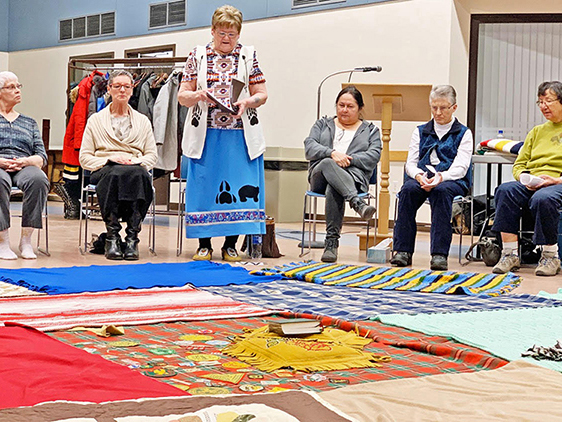
The KAIROS blanket exercise teaches the history of Indigenous Peoples that many Canadians haven’t learned. Photograph courtesy of Darryl Millette/RC Diocese of Saskatoon
With knowledge comes responsibility
Fear has always impeded the relationship-building between Indigenous and non-Indigenous people, says Desjarlais, and she hopes this resource guide does something to challenge any fear that surfaces in those that venture to learn from it. “There’s all sorts of fear: fear of the unknown, of what’s different, of growing as a human being. I think it’s important that we challenge fear when it shows up because fear has no place in love. And that’s what relationships are based on is love—caring for one another as human beings.”
Monica McKay, director of Aboriginal Initiatives within the Office of the Vice-President, Equity and Community Inclusion, who established the Ryerson Aboriginal Student Services (RASS) and the Aboriginal Student Centre, says that harmful knowledge systems still exist across the country, and work toward unlearning is essential.
“The systems in Canada that ensure people know nothing about Indigenous Peoples are still in place. Dismantling that is really difficult, because it’s so thoroughly embedded,” she says. “So I echo Amy’s thoughts on the fear of the unknown, and the fear of letting go. I think of Maya Angelou, saying, ‘When you don’t know, you don’t know. But when you begin to know, it’s your responsibility to do better.’ Seeking knowledge is not something to be entered into lightly because with it comes responsibility.”
The work has to move beyond books, says McKay, into engaging with learning and unlearning in experiential ways that call us into relationship with others. “When I’m asked to provide a Traditional Opening in a good way, I often end my thanksgiving with: be mindful of your words, actions, decisions and behaviour and their impact on those around you. I hope that those are things that people begin to think about and incorporate in their whole lives, because that’s where transformation and change happen.”
Learn and unlearn
Some of the resources Desjarlais and the Rebirthed Teachings Working Group have put together:
- Read the Truth and Reconciliation Commission’s reports, including the executive summary and the 94 calls to action
- Take the University of Alberta’s free online course
- Read the resources compiled by the On Canada Project
- Learn about and support Tk’emlúps te Secwépemc
- Register for the Certificate in Indigenous Knowledges and Experiences through The Chang School
- Read Calls to Action Accountability: A 2021 Status Update on Reconciliation by Yellowhead Institute researchers


